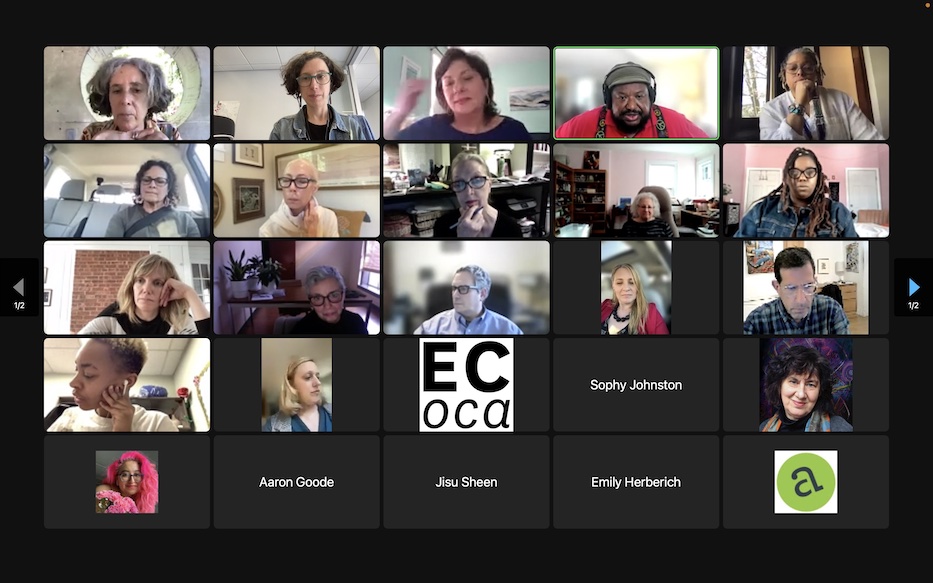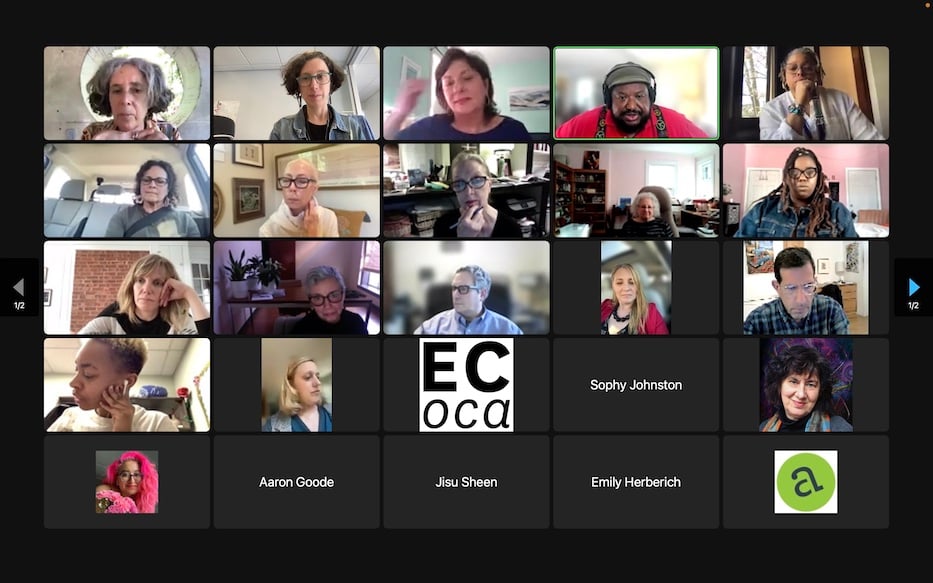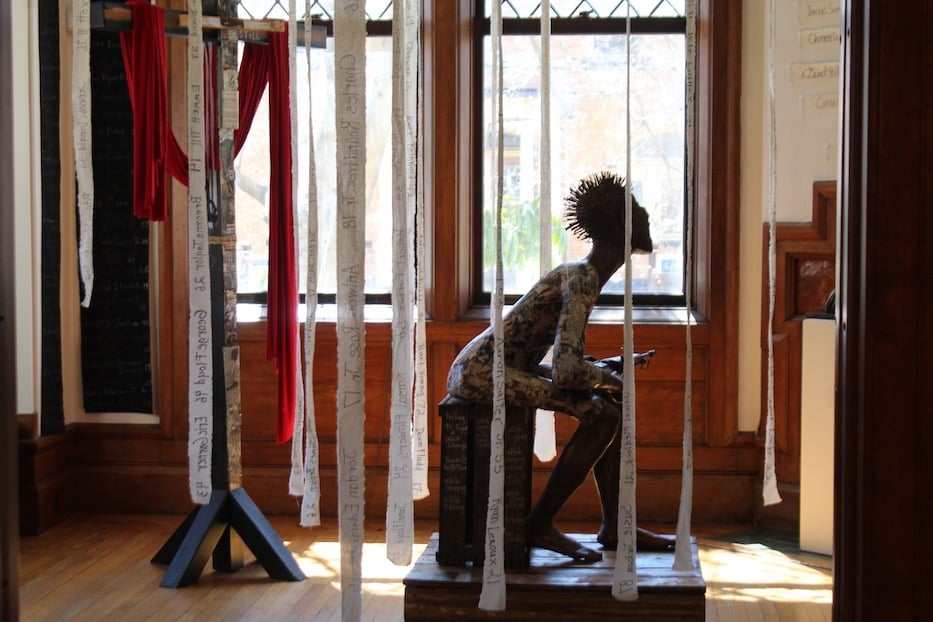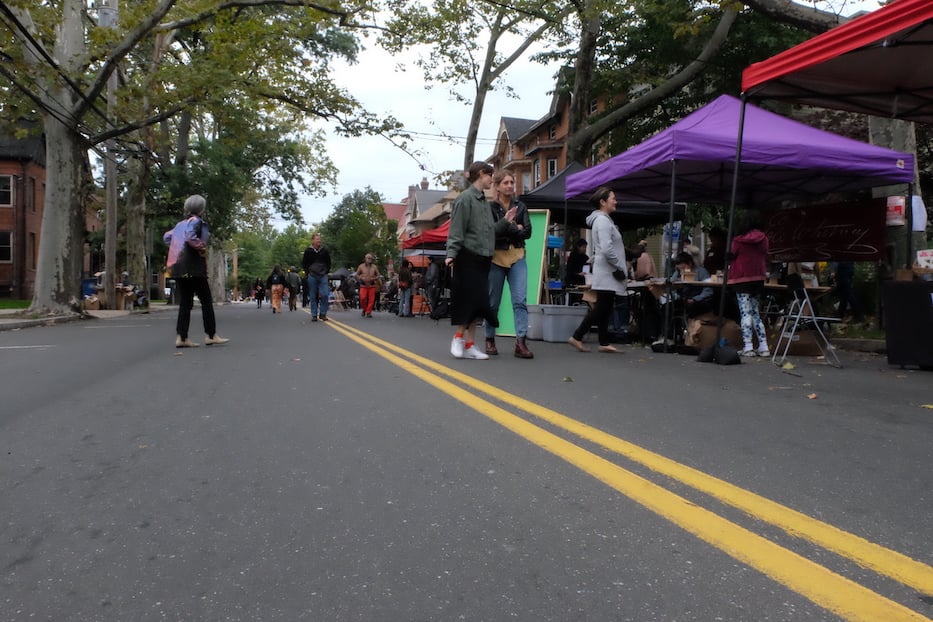
Culture & Community | Ely Center of Contemporary Art | Arts & Culture | Visual Arts

Screenshot via Zoom.
The first employee handbook is forthcoming. A new human resources consultant is now in the building and working with the board. And remaining board leadership will be stepping down—but not until the end of this year.
That is, unless they begin listening to the working artists asking them to do so immediately.
Those answers came out of a second weekly “Community Conversation” from the Ely Center for Contemporary Art (ECoCA) last Wednesday, as working artists, current and former educators, Board Co-Chairs Helen Kauder and Debbie Hesse, and members of the greater New Haven community logged on to a Zoom to continue a conversation around next steps at the 51 Trumbull St. gallery space.
It followed nearly seven months of internal disputes and allegations of harm that became public last week, in multiple articles from the New Haven Independent. More on that below.
Rev. Kevin Ewing, a citywide arts advocate who is the interim pastor at United Church on the Green, facilitated Wednesday’s conversation. He said multiple times throughout the evening that he did not yet think the Ely Center’s board had done enough repair in the community to begin the healing process. A third conversation with facilitator and artist Frank Brady is scheduled for this Wednesday, April 19, at 4 p.m. at 51 Trumbull St.
“What has happened here is a lack of trust,” Ewing said at the beginning of a long and often tense conversation, in which messages multiplied in the chat as people spoke. “Trust has been broken. And so, the resolution that I am hoping we can come to is that trust can be regained.”
The story of the conversation is also the story of a nascent not-for-profit that has, in the past year, failed to protect both employees and many of its board members. In 2020, the board brought on Suneet Talpade, who in 2013 was arrested for possession of child pornography, as its treasurer. Back in 2020, board members did not perform a background check or disclose Talpade’s previous conviction; Kauder has since said publicly that she believes in a second-chance society, in which the arts are part of a path to rehabilitation.
In 2022, longtime employee Maxim Schmidt, who for four years served as the center’s gallery coordinator and curatorial assistant, became aware of Talpade’s previous conviction. When he raised concerns about his presence on the board and at an autumn block party for the center, he said that fellow board members dismissed his concerns, according to the New Haven Independent.
Schmidt later resigned after reporting perceived harm and verbal and emotional abuse, including that which came from Talpade’s wife during an annual performance review. At last Wednesday’s meeting, Kauder confirmed that “a former board member acted uncivilly” in that performance review and added that “board members need to be trained in nonviolent communications” going forward.
Talpade and his wife have also since left the board, as have several other board members. He did not respond to a request for comment made Monday afternoon via phone call.
At no time during this period, or in the six years of the Ely Center’s history as an incorporated nonprofit beforehand, did anyone on the board draft an employee handbook and have a lawyer review it. During the time, there was no formal procedure reporting a complaint, and no human resources officer or nonprofit ombudsperson to mediate a situation.
The board has since brought in Caroline Koziatek, a human resources consultant, with funding from the Community Foundation for Greater New Haven. Koziatek did not specify the length of time she will be with the organization.
At the heart of Wednesday’s conversation were two tensions, both of which ultimately involve a transfer of power at the Trumbull Street space. The first, during which community and board members often found themselves at odds, addressed the extent to which people believe that their peers are redeemable, and capable of rehabilitation.
The second, which emerged as several artists came forward to speak, pressed Kauder and Hesse to step down immediately. By the end of the evening, both had said that they would step down at the end of the year, but intended to remain on the board and in leadership until that time.
“What Does Rehabilitation Look Like?”

Linda Vauters Mickens’ “Redemption” installed at the Ely Center of Contemporary Art (ECoCA) at 51 Trumbull St. as part of Truth In Three Colors. Lucy Gellman Photo.
From the top of the conversation, several attendees said that they were concerned with the board’s lack of transparency regarding Talpade’s previous conviction. Since 2013, Talpade has not been accused or convicted of committing any new crime involving children or child pornography.
Since last week’s article in the New Haven Independent, two camps have emerged: those who believe Talpade served his time and should be able to re-engage with organizations, and those who see the conviction as marking Talpade as unsafe for the community that the Ely Center serves.
Caroline Rosenstone, who founded the creative writing department at the Educational Center for the Arts (ECA) in 1985, described herself as “disturbed and upset” by Talpade’s presence at the Ely Center’s October 2022 block party. She clarified that she was not there at the time, and decided to come to the community conversation after reading the article in the New Haven Independent last week.
“I’m sorry, if we’re talking about accountability, another synonym for that is responsibility,” she said.
“Who do you need to hear that from?” Ewing asked. The question hung in the air as attendees stared into their screens, waiting. Across two pages, they included young artists and entrepreneurs, sculptors and dancers who have been in the field for decades, heads and employees of several of New Haven's arts nonprofits.
“This was the institution,” Rosenstone responded after a beat. She clarified that she would like accountability from board leadership, including more formal processes in place going forward. After a pause, Kauder asked if she could respond.
“At the time when this came up at the very tail end of September, we did consult with an attorney,” she said. She detailed what became a series of discussions and deliberations that lasted into the fall. The board, she said, agreed that a significant amount of time had elapsed since the original conviction, and that Talpade was “a contributing member of the arts community.” During that time, several board members did step down.
“At the block party, there were children’s activities out on the street, and Suneet was not asked to run any children’s activities,” she said. “He is free to circulate in society. We don’t check people at the door in terms of their criminal justice background.”
Not all attendees agreed. “All of this is extremely triggering,” said artist Briana Williams, whose creative footprint includes time in the Audubon Arts District and at the Ely Center. She said that while she believes in second chances, she doesn’t feel like the board is listening to artists in the community who have asked for more open lines of communication.
“I don’t trust the decision making that you’ve made so far and I don’t know how to trust this going forward. It’s common sense.”
“What does rehabilitation look like?” she later asked. Kauder responded that the remaining five board members will be doing a “safe space” training with Jenora Ledbetter of the Wallingford-based Self-Care Network and multiple DEI (Diversity, Equity, and Inclusion) trainings “looking at power and inappropriate expressions of power.”
Others pointed to the belief in a second chance society, particularly in response to the suggestion that certain crimes are beyond redemption. Amber Vlangas, donor relations officer for the ACLU of Connecticut and a board member of the Restorative Action Alliance, urged attendees to consider the potential for rehabilitation outside of a carceral context.
“When we talk about people who have committed sexual harm, appearance on a registry and a previous conviction is not synonymous with risk,” she said.
Wábi Arts Founder Kim Weston, who has curated the current exhibition at the Ely Center, noted the number of companies across the country at which employees may be unknowingly working alongside people with previous convictions who have been given a second chance. As she spoke, responses filled the chat, sometimes coming in within seconds of each other.
“This is not a company,” wrote artist Ruby Gonzalez Hernandez, whose recent large-scale printmaking has been dedicated largely to the process of helping herself heal from systems that have been oppressive in her own life.
“I agree with Caroline’s [Rosenstone] earlier comment that decisions here seemed naive and negligent toward the community,” wrote Emily Herberich, a multimedia artist and radio host at the Bridgeport-based station WPKN. “This was already public and clarity about the nature of the offense/record would have been appreciated.”
“We hold organizations dedicated to service to the community to a higher ethical standard, not just the bare legal standard,” she later added.
“Give Your Power To Artists”

Artists at the Ely Center's Block Party last October. Lindsay Skedgell File Photo.
The idea of that ethical standard—and what the board can now do to rebuild trust—resurfaced later in the conversation, as multiple artists called for both Kauder and Hesse to step down. Leading the charge, Gonzalez Hernandez pointed to the lack of trust artists now have in the organization, which has long branded itself as a community space.
“You can step down, give up your power to artists,” she said, addressing the board co-chairs. “If I can be absolutely transparent, I have no reason to believe that you are turning over a new leaf.”
“In acknowledging how this has deeply hurt the community, will you step down and give your power to artists to whom the power was always meant to be given?” she later added, addressing Kauder specifically.
“The answer is yes,” but not immediately, Kauder responded. “I agreed to step into this role with the understanding that it was a limited time. I have a few more months left.” She added that she is trying to actively recruit new board members and is hopeful that some will come forward. She added that she expects to step down by the end of the year, but has no plans to resign immediately.
“So your answer is no, not right now?” Gonzalez Hernandez asked. She turned to Hesse, who had been listening quietly from the front seat of her car. Her dangly earrings bobbed as she spoke methodically.
“I also would like to look for somebody to take over,” she said. “And that will be by the end of the year as well.”
“So your answer is no, not right now?” Gonzalez Hernandez said.
Jisu Sheen, a painter and multimedia artist who is the co-founder of Second Floor Hardware School, echoed Gonzalez Hernandez, noting the amount of emotional distress that Schmidt faced—including during a performance review—because there were not standard procedures in place. “It is not normal to have to wonder whether your bosses are lying to you about the legality of what is going on,” she said.
The community conversations come in the midst of a months-long unraveling among three of the city’s legacy visual arts institutions. In January, Artspace New Haven Director Lisa Dent left for a position at the Massachusetts Museum of Contemporary Art (Mass MoCA). Then in February, Anne Coates announced that she was leaving Creative Arts Workshop (CAW).
Rebekah Moore, a lifelong New Havener who is now the program director at the Arts Council of Greater New Haven, noted the need for stronger institutional policies. At the Arts Council, for instance, there is a system of reporting incidents to a designated board member when employees do not feel comfortable talking to a supervisor or the executive director.
All board and staff members must also take a multi-day “Undoing Racism” training, offered by groups like the People's Institute for Survival and Beyond and Elm City UROC. In the interest of full transparency, the Arts Paper is a part of, but editorially independent from, the Arts Council.
Both she and artist Megan Shaughnessy, a fellow employee of the Arts Council who has in the past supported and shown at the Ely Center, added that a personnel handbook is designed specifically for situations like the one in which the Ely Center found itself. Koziatek, who has worked in human resources for decades, said that she is working closely with the board to draft and finalize one in the coming months.
Moore noted that trust goes beyond a handbook: it is about a public apology and financial remuneration. To the response from Kauder and Hesse that Schmidt had not responded to them, Moore noted that a severance package is easy enough to mail to someone. Multiple artists echoed that sentiment in the chat.
“Sorry is okay, but let’s focus on restoring trust and building forgiveness,” wrote Dyme Ellis, a musician, spoken word artist, and poet, in the chat. “Sorry is a one-sided emotion. The community [can’t] rely on sorry leaders.”
Ewing, who had both steered the conversation and stepped back to listen, piped up to let attendees know their time was coming to an end. He urged artists in the group, particularly Gonzalez Hernandez and Sheen to “keep it up—we need people that have passion and people that care to keep on us going forward.”
He added that he does not know if he wants to be involved in community discussions going forward, and does not believe that the Ely Center has reached a point where healing, on a community level, is possible.
“In this world, there is a lot of change happening,” he said. “There are a lot of voices that are speaking up. And the arts are sort of leading the way. I think for the good of the community, for the good of the world, it’s good that this stuff is coming out.”
“A lot of what I heard today was about process and fixing the systems in place,” he continued. “We got to spend time focusing on what’s going to heal people. And I don’t think we’ve got there yet."

